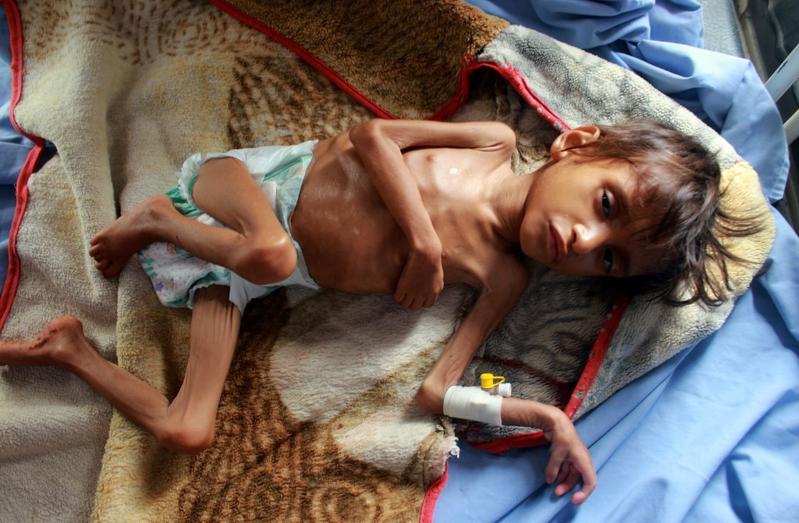 A Yemeni child suffering from malnutrition lies in a bed at a treatment center in Yemen's northern Hajjah province on July, 5, 2020. (ESSA AHMED / AFP)
A Yemeni child suffering from malnutrition lies in a bed at a treatment center in Yemen's northern Hajjah province on July, 5, 2020. (ESSA AHMED / AFP)
LONDON / ROME - The director general of the World Health Organisation said on Wednesday an additional 10,000 children a month could die this year from malnutrition as a result of the impact of the COVID-19 pandemic.
Dr Tedros Adhanom Ghebreyesus, speaking at a UN Food and Agriculture Organization (FAO) conference, said he expected a 14 percent increase this year in children suffering from malnutrition as a result of the pandemic.
Dr Tedros Adhanom Ghebreyesus, speaking at a UN Food and Agriculture Organization (FAO) conference, said he expected a 14 percent increase this year in children suffering from malnutrition as a result of the pandemic
This equates to 6.7 million more malnourished children, mostly in sub-Saharan Africa and south Asia.
“The pandemic has caused serious disruptions to essential services, immunization, maternal services, child nutrition, family planning and more,” he said.
“We can not accept a world where the rich have access to healthy diets while the poor are left behind,” he added.
Meanwhile, a senior official with the Rome-based World Food Programme (WFP) said that the COVID-19 pandemic is making the agency's ongoing fight against hunger and poverty even more of a challenge.
ALSO READ: Specter of famine to haunt millions of people
In a recent interview with Xinhua, WFP's Assistant Executive Director Ute Klamert said that the pandemic is turning already difficult problems involving poverty and hunger into moving targets.
"The frontline battle against COVID-19 is shifting across the globe and the pandemic is now making the poorest poorer, and the hungriest hungrier," said Klamert. "The pandemic is multiplying misery by preying on the weak and vulnerable, pushing millions out of work and into hunger, disrupting vital supply chains and threatening the very fabric of our societies."
She said the pandemic is "changing the face of hunger by dragging urban populations into destitution and compounding the effects of climate change, conflict and socio-economic shocks in regions of the world that had previously escaped severe levels of food insecurity."
Klamert said the pandemic, combined with other factors including warfare and extreme weather, will have an immediate impact on the world's poorest.
"Global poverty is likely to increase this year for the first time since 1998," she said. "According to the latest World Bank estimates, an additional 150 million people could be pushed into extreme poverty by the end of next year."
Klamert said WFP is in a strong position to help reduce the blow to the world's poorest.
ALSO READ: UNICEF says 200m children under 5 eat too little or too much
"A hunger pandemic remains a very real threat with a number of countries at risk of further deterioration if their economic situation continues to decline," she said. "WFP is uniquely positioned to fight these challenges, having unparalleled deep-field experience and a range of technologies to identify, anticipate, and respond to threats as they emerge."
The WFP official also addressed the value of South-South cooperation, a broad framework of cooperation among developing countries in the global south.
"Several countries have particularly successful in reducing hunger over the past 30 or 40 years, including enormous countries like China and Brazil and other smaller countries like Cuba, Ghana, and Vietnam," she said.
"There are also some common factors when it comes to countries that have made a huge improvement in the food security of their population," Klamert went on.
"That includes the effectiveness of national policies and the efficiency of social protection systems to support the more vulnerable members of society. Another crucial issue is the support given to smallholder farmers to improve their production and resilience to drought and other climate change-related shocks."
READ MORE: UNICEF: 400,000 Congo children suffering severe malnutrition
WFP won the 2020 Nobel Peace Prize last week. Regarding the prestigious honor, Klamert said the entire agency was "immensely proud and humbled" and that the "feeling of excitement at the announcement has been palpable at our headquarters in Rome." But she also called for attention to the plight of those WFP was created to serve.
"There are nearly 100 million vulnerable people in more than 80 countries to whom WFP provides daily food assistance," Klamert said. "As the COVID-19 pandemic continues to ravage the planet, driving more and more people into destitution, WFP is ready to scale up to reach many more millions of people if required," though she noted the agency needed more funding to carry out that goal.
"We have the expertise and the tools to help address needs both efficiently and cost-effectively," she said. "But all this requires funding and we will need close to US$5 billion to maintain our current level of heightened response."


